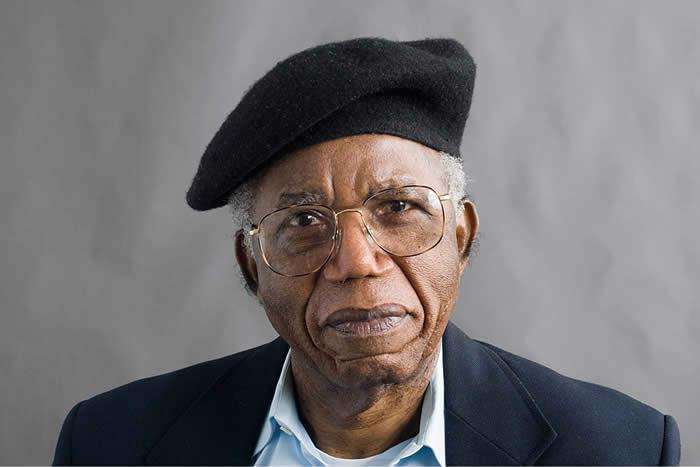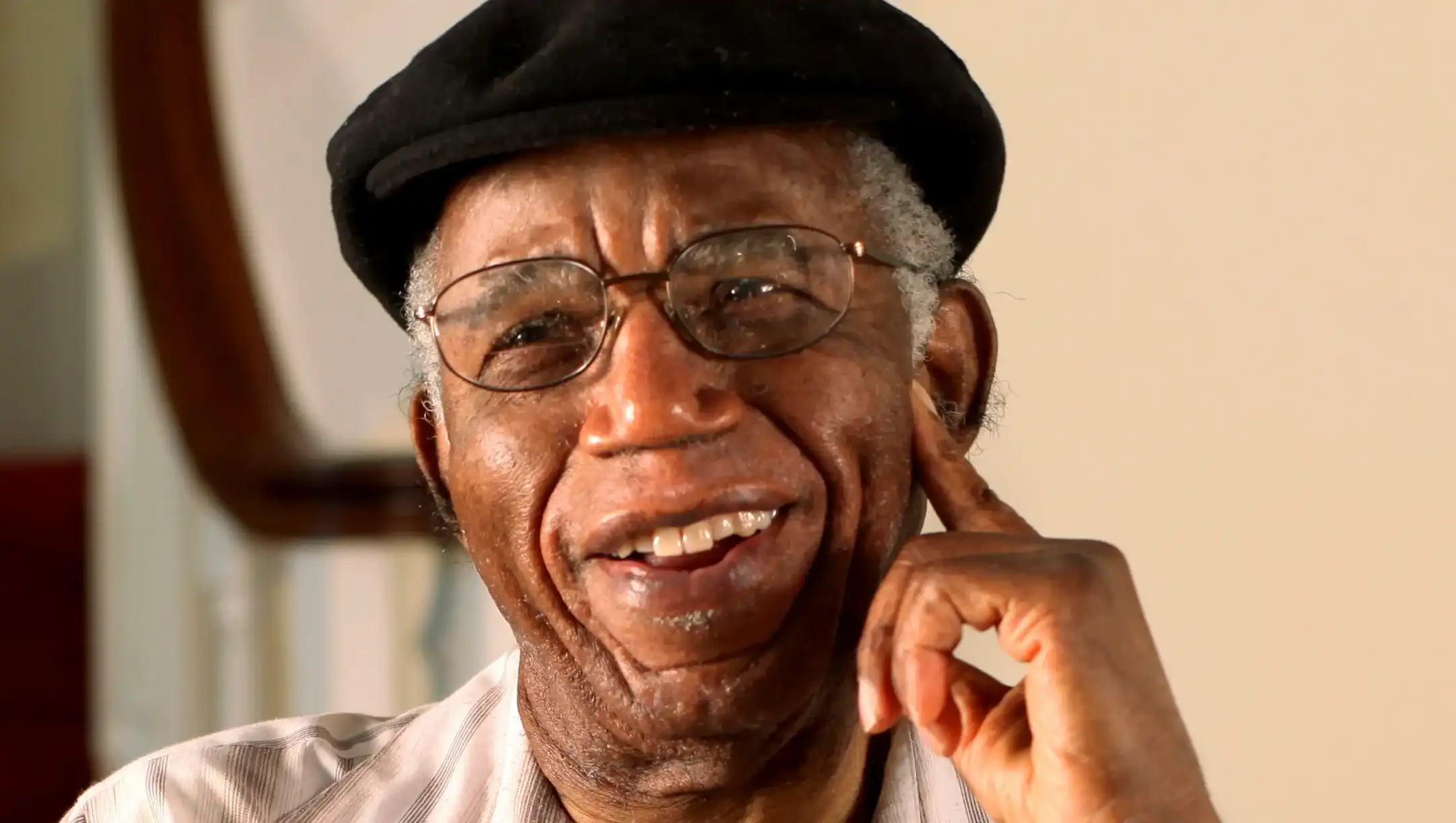
Who was Chinua Achebe? Age, Bio, Net Worth, Books, Wife, Children, Family, Education, Poems, Awards
0 Posted By Kaptain KushBiography
Chinua Achebe, born Albert Chinụalụmọgụ Achebe on November 16 in Ogidi, Nigeria, was a monumental figure in African literature. He was a celebrated novelist, poet, and critic.
Renowned for his novel Things Fall Apart, Achebe played a key role in reshaping how African experiences were portrayed, presenting them authentically from an African point of view and challenging colonial narratives. His body of work, including novels, essays, short stories, and poetry, delves into themes like pre-colonial African life, the impact of European colonization, and the complexities of post-colonial societies.
Trending Now!!:
- Chimamanda Ngozi Adichie Biography: Books, Husband, Age, Quotes, Net Worth, Education, Pronunciation, Daughter, Short Stories, Ted Talk
- Gordon Ramsay Biography: Net Worth, Children, Age, TV Shows, Wife, Recipe, Restaurants, Young, Family, Instagram, Memes, Wikipedia
- Aubrey Matshiqi Biography: Wife, Age, Twitter, Instagram, Net Worth, Qualifications, YouTube, Contact Details, YouTube, Education, Wikipedia
- Molly Yeh’s Husband Nick Hagen Biography: Net Worth, Age, Family, Nationality, Parents, Sister, Kids
- Laurie Idahosa Biography: Parents, Age, Husband, Net Worth, Instagram, Wikipedia, Children
Achebe‘s distinctive blend of traditional storytelling with contemporary narrative forms has left a lasting impact on literature, inspiring countless writers. Beyond his writing, he was an esteemed professor who taught in the United States and Nigeria, nurturing future storytellers. His dedication to social and political issues in Nigeria and Africa deeply informed his work, making him a powerful cultural voice.
Achebe passed away on March 21, 2013, but his influence endures, forever changing how African stories are told and valued in global literature.
Chinua Achebe | |
|---|---|
 | |
| Wiki Facts & About Data | |
| Real Name: | Albert Chinụalụmọgụ Achebe |
| Stage Name: | Chinua Achebe |
| Born: | 16 November 1930 (age 82 years old) |
| Place of Birth: | Ogidi, Idemili North, Anambra, Nigeria |
| State Of Origin: | Anambra State |
| Died: | 21 March 2013 (age 82 years), Boston, Massachusetts, United States |
| Nationality: | Nigerian |
| Education: | St. Philips’ Central School, Government College, Umuahia, University of Ibadan |
| Height: | N/A |
| Parents: | Isaiah Okafo Achebe, Janet Anaenechi Iloegbunam Achebe |
| Siblings: | Zinobia Uzoma Ikpeze, Frank Okwuofu Achebe, Augustine Nduka Achebe, Grace Nwanneka Achebe, John Chukwuemeka Ifeanyichukwu Achebe |
| Spouse: | Christiana Chinwe Okoli (m. 1961–2013) |
| Girlfriend • Partner: | N/A |
| Children: | Nwando Achebe, Chinelo Achebe, Chidi Chike Achebe, Ikechukwu Achebe |
| Occupation: | Poet • Novelist |
| Net Worth: | $3 million (USD) |
Early Life & Education
Chinua Achebe was born on November 16, 1930, in Ogidi, a small village in southeastern Nigeria, in what is now Anambra State. He belonged to the Igbo ethnic group, known for its rich storytelling traditions which significantly influenced Achebe‘s later work.
Raised in a family that was among the first in his village to convert to Christianity, Achebe‘s worldview was shaped by a dual heritage—Christianity alongside traditional Igbo spiritual beliefs, a theme reflected in his writings.
His father, Isaiah Okafo Achebe, worked as a catechist and church teacher in the Church Missionary Society, while his mother, Janet Anaenechi Iloegbunam, was also a convert to Christianity. Achebe was one of six children including Zinobia Uzoma Ikpeze, Frank Okwuofu Achebe, Augustine Nduka Achebe, Grace Nwanneka Achebe, and John Chukwuemeka Ifeanyichukwu Achebe, growing up in a closely knit family environment which likely contributed to his storytelling abilities, as traditional Igbo life is highly communal.
For his education, Achebe attended St. Philips’ Central School in Ogidi, where he was partly educated in English, an unusual setting for the time and region. He proceeded to Government College, Umuahia, known for its high academic standards and its role in preparing future Nigerian leaders.
Initially receiving a scholarship to study medicine at the University College of Ibadan (University of Ibadan), Achebe later switched his focus to English, history, and theology. This shift was influenced by his growing interest in literature’s power to change perceptions and realities, especially during Nigeria’s cultural and political awakening post-independence.
Career
Chinua Achebe‘s career left an indelible mark on literature, education, and cultural discourse. After university, he joined the Nigerian Broadcasting Corporation in Lagos, a role he held until 1961. During this time, he wrote and published Things Fall Apart in 1958, a novel that gained international acclaim for its portrayal of the colonial experience from an African perspective, challenging dominant Eurocentric narratives.
Achebe‘s literary path continued with acclaimed works like No Longer at Ease, Arrow of God, A Man of the People, and Anthills of the Savannah. These novels explored various dimensions of African life, from traditional pre-colonial customs to the complexities of post-independence society. His non-fiction, including essay collections, offered critical reflections on literature, politics, and the role of the writer in post-colonial Africa.
In parallel with his literary career, Achebe had a distinguished academic journey. He was a founding member of the English Department at the University of Nigeria, Nsukka, and taught at numerous institutions, including the University of Massachusetts Amherst, the University of Connecticut, and Bard College in the United States, where he mentored and influenced generations of students.
Achebe was also a vocal critic of corruption, military rule, and governance failures in Nigeria and Africa, using his platform to serve as a political and cultural commentator. His public life established him as a global ambassador for African literature, advocating for a deeper understanding of African culture and history.
Throughout his career, Achebe received numerous honours, including the Nigerian National Order of Merit, the Peace Prize of the German Book Trade, and honorary degrees, culminating in the Man Booker International Prize in 2007 for lifetime achievement.
Though he passed away in 2013, his work continues to inspire, with his call for Africans to tell their own stories resonating in the works of contemporary African writers. Achebe’s influence extends beyond literature, with his ideas echoed in film, music, and other art forms, reinforcing his legacy as a transformative figure in reshaping perceptions of Africa.
Awards & Recognition
Here are some of the notable awards and recognitions that Chinua Achebe received during his lifetime:
- Margaret Wong Prize (1984) – Awarded for “Anthills of the Savannah.”
- Commonwealth Poetry Prize (1973) – For his poetry collection “Christmas in Biafra and Other Poems.”
- Nigerian National Order of Merit (1979) – Nigeria’s highest honor for academic work.
- Jock Campbell New Statesman Prize – For “The Sacrificial Egg and Other Stories.”
- The Peace Prize of the German Book Trade (2002) – Recognized for his literary contributions towards peace.
- Honorary Fellowship – Bestowed by the American Academy of Arts and Letters.
- Honoris Causa Degrees – Received from many prestigious universities worldwide, including Harvard University, Brown University, and the University of Lagos.
- Man Booker International Prize (2007) – Awarded for lifetime achievement in fiction on the world stage.
- Commander of the Federal Republic (CFR) – One of Nigeria’s highest honors, conferred posthumously in 2013.
- The Dorothy and Lillian Gish Prize – For contributions to the arts.
- The Nigerian Centennial Award – Celebrating Nigerian achievement in the arts.
- The St. Louis Literary Award – Honoring significant contributions to literature.
- The Nigerian Silver Jubilee Medal – For contributions to Nigerian culture.
- The Frank Knox Memorial Fellowship – To study at Princeton University, though he did not take it up.
Personal Life
Chinua Achebe married Christie Chinwe Okoli in 1961, who herself was a professor of education and contributed significantly to educational theory in Nigeria.
They maintained a marriage that lasted over five decades until Achebe‘s death in 2013. Together, they had four children, Nwando Achebe, Chinelo Achebe, Chidi Chike Achebe, and Ikechukwu Achebe. There is no publicly available information regarding Chinua Achebe‘s height.
Cause of Death
Chinua Achebe, the renowned Nigerian author, passed away on March 21, 2013, at the age of 82. He died following a brief illness, as announced by his literary agent, Andrew Wylie, and confirmed by various reports. The exact nature of the illness was not specified in public statements, respecting the family’s privacy.
Achebe‘s death was mourned worldwide, with tributes highlighting his significant contributions to African literature and his role in shaping global perceptions of African culture through his works.
Net Worth
Chinua Achebe‘s net worth was reportedly around $3 million. This figure might reflect a combination of his earnings from book sales, academic positions, speaking engagements, and various awards throughout his career, although exact financial details were never publicly detailed during his lifetime or upon his passing.
Achebe‘s financial status was more aligned with his intellectual and cultural contributions rather than showcasing opulence, embodying a life focused on the enrichment of African narratives and education rather than material wealth.
Famous Works
Here is a comprehensive list of Chinua Achebe‘s body of works, including his notable novels, short stories, poems, essays, and children’s books:
Novels
- “Things Fall Apart” (1958) – His most famous work, depicting pre-colonial life in Nigeria and the arrival of European missionaries.
- “No Longer at Ease” (1960) – Follows the grandson of a character from “Things Fall Apart,” dealing with corruption and cultural clash in post-independence Nigeria.
- “Arrow of God” (1964) – Focuses on the Igbo village of Umuaro and the clash between traditional and colonial governance.
- “A Man of the People” (1966) – A political novel about corruption and the coup in Nigeria.
- “Anthills of the Savannah” (1987) – Explores issues of power, corruption, and the role of the intellectual in society.
Short Story Collections
- “Chike and the River” (1966) – A children’s book that could also be considered a novella or long short story.
Poetry
- “Christmas in Biafra and Other Poems” (1973) – Reflects on the Nigerian Civil War.
Essays and Non-fiction
- “Morning Yet on Creation Day” (1975) – A collection of essays on literature and politics.
- “The Trouble with Nigeria” (1983) – Discusses the challenges facing Nigeria at the time.
- “Hopes and Impediments” (1988) – A collection of essays on African literature, culture, and the role of the storyteller.
- “Home and Exile” (2000) – Autobiographical essays reflecting on themes of home, identity, and displacement.
- “The Education of a British-Protected Child” (2009) – Autobiographical, reflecting on his education and the colonial experience.
Children’s Books
- “How the Leopard Got His Claws” (1972) – A collection of folk tales retold by Achebe.
- “The Flute” (1977) – A collaboration with John Iroaganachi, featuring Nigerian folktales.
- “Chike and the River” (1966) – Though often categorized with his novels, it’s also suitable for younger readers.
Anthologies and Edited Works
- “African Short Stories” (1985) – Edited by Achebe, featuring works by various African authors.
Unfinished or Posthumously Published Works
- “There Was a Country: A Personal History of Biafra” (2012) – A memoir reflecting on the Nigerian Civil War, published shortly before his death.
Chinua Achebe’s works span various genres and forms, but they are unified by their focus on African culture, history, and the impact of colonialism and its aftermath.
NOTICE!! NOTICE!! NOTICE!!
DISCLAIMER!! : Every Biography and Content Published On TheCityCeleb are For Knowledge Reason. Don't Hesitate to Reach Out for Any Correction || Suggestion || Copyright!!CORRECT@thecityceleb.com


